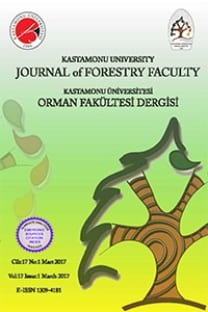Düzce ilinde yırtıcı memeli (Carnivora:Mammalia) türlerin zamansal ve mekânsal dağılımı
Spatial and temporal distribution of Carnivora (Mammalia) species in Düzce Province
___
- Albayrak İ, Pamukoğlu N, Aşan N, 1997. Bibliography of Turkish Carnivores (Mammalia: Carnivore). Communication Fas. des. Scien. de L univ. d-Ankara. Series C, 15, 1-20.
- Ambarlı, H., Bilgin, C.C. 2008. Human–brown bear conflicts in Artvin, northeastern Turkey: Encounters, damage, and attitudes. Ursus, 19(2), 146-153.
- Anonim, 2016. http://www.mgm.gov.tr/. Düzce iklim verileri. [Ziyaret: 17.02.2016]
- Beşkardeş, V. 2016. Yedigöller Yaban Hayatı Geliştirme Sahasındaki İri Cüsseli Memeli Hayvanlar ve Sonbahar Dönemi Habitat Tercihleri Düzce Üniv. Ormancılık Dergisi, 12(1), 137-144.
- Can, Ö.E., Togan, İ. 2009. Camera trapping of large mammals in Yenice Forest, Turkey: local information versus camera traps. Oryx, 43(03), 427-430.
- Capinera, J. 2011. Insects and wildlife: arthropods and their relationships with wild vertebrate animals. John Wiley & Sons.
- Ćirović, D., Penezić, A., Milenković, M., Paunović, M. 2014. Winter diet composition of the golden jackal (Canis aureus L., 1758) in Serbia. Mammalian Biology-Zeitschrift für Säugetierkunde, 79(2), 132-137.
- Çam, P., Ölmez, İ. 2015. Sinop İli Memeli Hayvan Faunasının Değerlendirilmesi. Iğdır Univ. J. Inst. Sci. & Tech. 5(3), 9-16
- Gittleman, J.L. 1985. Carnivore body size: ecological and taxonomic correlates. Oecologia, 67(4), 540-554.
- Hızal, E. 2008 Kapıdağ Yarımadası Memeli (Mammalia) Faunası. Bartın Orman Fakültesi Dergisi. Cilt: 10, Sayı: 14, S.: 22-32
- İbiş, O., Aksöyek, E., Özcan, S., Tez, C. 2015. A preliminary phylogenetic analysis of golden jackals (Canis aureus)(Canidae: Carnivora: Mammalia) from Turkey based on mitochondrial D-loop sequences. Vertebr Zool, 65, 391-397.
- Kinnaird, M.F., O'brien, T.G., 2012. Effects of Private‐Land Use, Livestock Management, and Human Tolerance on Diversity, Distribution, and Abundance of Large African Mammals. Conservation Biology, 26(6), 1026-1039.
- Kumerloeve, H. 1978. Türkiye'nin memeli hayvanları. Journal of the Faculty of Forestry Istanbul University (JFFIU), 28(1), 178-204.
- Küçük, Ö. 2012. Taşköprü Orman İşletme Müdürlüğü’nün Yaban Hayatı Potansiyeli ve Değerlendirilmesi. Bilimsel Rapor. Kastamonu Üniv. Orman Fakültesi
- Miller, B., Dugelby, B., Foreman, D., del Rio, C.M., Noss, R., Phillips, M., Reading, R., Soulé, M E., Terborgh, J., Willcox, L. 2001. The importance of large carnivores to healthy ecosystems. Endangered Species Update, 18(5), 202-210.
- Mitchell-Jones, A.J., Amori, G., Bogdanowicz, W., Kryštufek, B., Reignders, P.J.H., Spitzenberger, F., Stubbe, M., Thissen, J.B.M., Vohralik, V., Zima, J. 1999. The Atlas of European Mammals, Academic Pres., London, 0-85661-130-1.
- Özkazanç, N.K. 2012. Sökü Yaban Hayatı Koruma Alanı’nda Tespit Edilen Büyük Memeli Hayvanlar. Uluslararası Bartın Orman Fakültesi Dergisi, 14(21), 92-99.
- Özkurt, Ş., Sözen, M., Yiğit, N., Çolak, E. 1998. Notes on distributional records and some characteristics of five carnivore species (Mammalia: Carnivora) in Turkey. Turkish Journal of Zoology, 22(4), 285-288.
- Ripple, W.J., Estes, J. A., Beschta, R. L., Wilmers, C.C., Ritchie, E.G., Hebblewhite, M., Berger, J., Elmhagen, B., Letnic, M., Nelson, M.P., Schmitz, O.J., Smith, D.W., Wallach, A.D., Schmitz, O.J. 2014. Status and ecological effects of the world’s largest carnivores. Science, 343(6167), 1241484.
- Roberts, N.J., 2011. Investigation into survey techniques of large mammals: surveyor competence and camera-trapping vs. transect-sampling. Bioscience Horizons, 4(1), 40-49
- Toyran, K. 2016. Predatory Mammal Species of Bitlis Province (Mammalia: Carnivora Iğdır Univ. J. Inst. Sci. & Tech., 6(2), 27-32
- Ünal, S. 2012. Yenice fauna raporu. Kastamonu Üniv. Orman Fakültesi
- van de Kerk M, de Kroon H, Conde DA, Jongejans, E. 2013. Carnivora Population Dynamics Are as Slow and as Fast as Those of Other Mammals: Implications for Their Conservation. PLoS ONE 8(8), e70354. doi:10.1371/journal.pone.0070354
- ISSN: 1303-2399
- Yayın Aralığı: Yılda 3 Sayı
- Başlangıç: 2001
- Yayıncı: Kastamonu Üniversitesi
ÇİĞDEM ÖZER GENÇ, BURAK ARICAK
Düzce İlinde Yırtıcı Memeli Türlerin Zamansal ve Mekânsal Dağılımı
Kentsel Peyzaj Yapılarında Zemin Geçirimliliği Üzerine Bir Araştırma: Tekirdağ Örneği
ASLI KORKUT, PINAR GÜLTÜRK, TUĞBA ÜSTÜN TOPAL
Orman Ürünleri Endüstrisinde ISO/TS 16949:2009’un Uygulanması
Derya SEVİM KORKUT, Ertan SOLAK
Kastamonu Yöresi Beyler ve Karaçomak Baraji Gölü Sucul Kuşları
Abdullah UGIŞ, Erol AKKUZU, ÖZKAN EVCİN
Türker GÜLEÇ, ALPEREN KAYMAKCI
Arazi Kullanım Sınıfları İçin Farklı Kontrollü Sınıflandırma Algoritmalarının Karşılaştırılması
Erzincan Kenti Peyzaj Tasarım Alanlarında Kişilerin İhtiyaçlarının Analizlerle Belirlenmesi
Azapay Ümmühan Yalçınyavuz, Sevgi Yılmaz
Yönlendirilmiş Yonga Levhalarda Vidalama Torklarının Vida Çekme Direnci üzerine Etkisi
Önder Tor, Samet Demirel, Lingling Hu, Jilei Zhang
Isı Şoku Protein Ailesinden Hsp70 Genlerinin Okaliptüs Genomunda Saptanması ve Karakterizasyonu
